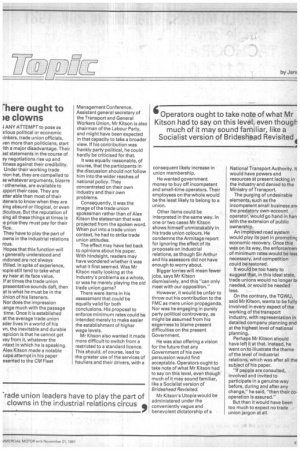'here ought to )e clowns
Page 45

If you've noticed an error in this article please click here to report it so we can fix it.
J ANY ATTEMPT to pose as srious political or economic tinkers, trade union officials, ien more than politicians, start ith a major disadvantage. Their ast statements in the course of ay negotiations rise up and itness against their credibility. Under their working trade lion hat, they are compelled to 3e whatever arguments, bizarre otherwise, are available to ipport their case. They are s.tter able than most of their ;teners to know when they are sing absurd or illogical, or even liculous. But the reputation of sing all these things at times is e price they must pay for their
They have to play the part of owns in the industrial relations rcus.
Hopes that this function will ; generally understood and mdoned are not always Ifilled. In spite of experience, mple still tend to take what ey hear at its face value. If at times the trade union presentative sounds daft, then at is what he must be in the Anion of his listeners.
Nor does the impression iange much with the passage time. Once it is established at the average trade union ader lives in a world of his vn, the inevitable and durable Ispicion is that he cannot get yay from it, whatever the ,ntext in which he is speaking. Alex Kitson made a notable cape attempt in his paper esented to the CM Fleet
Management Conference. Assistant general secretary of the Transport and General Workers Union, Mr Kitson is also chairman of the Labour Party, and might have been expected in that capacity to take a broader view. If his contribution was frankly party political, he could hardly be criticised for that.
It was equally reasonable, of course, that the participants in the discussion should not follow him into the wider reaches of national policy. They concentrated on their own industry and their own problems.
Consequently, it was the image of the trade union spokesman rather than of Alex Kitson the statesman that was projected from the spoken word. When put into a trade union context, he had to strike trade union attitudes.
The effect may have fed back to opinions about his paper. With hindsight, readers may have wondered whether it was what it first seemed. Was Mr Kitson really looking at the industry's problems as a whole, or was he merely playing the old trade union game?
There were items in his assessment that could be equally valid for both conclusions. His proposal to enforce minimum rates could be intended merely to make easier the establishment of higher wage levels.
Mr Kitson also wanted it made more difficult to switch from a restricted to a standard licence. This should, of course, lead to the greater use of the services of hauliers and their drivers, with a consequent likely increase in union membership.
He wanted government money to buy off incompetent and small-time operators. Their employees on the whole would be the least likely to belong to a union.
Other items could be interpreted in the same way. In one or two cases Mr Kitson shows himself unmistakably in his trade union colours. He condemns the Armitage 'report for ignoring the effect of its proposals on industrial relations, as though Sir Arthur and his assessors did not have enough to worry about.
Bigger lorries will mean fewer jobs, says Mr Kitson dismissively, and this "can only meet with our opposition."
However, it would be unfair to throw out his contribution to the FMC as mere union propaganda. Nor was he engaging in purely party political controversy, as might be assumed from his eagerness to blame present difficulties on the present Government.
He was also offering a vision for the future that any Government of his own persuasion would find acceptable. Operators ought to take note of what Mr Kitson had to say on this level, even though much of it may sound familiar, like a Socialist version of Brideshead Revisited.
Mr Kitson's Utopia would be administered under the conveniently vague and benevolent dictatorship of a National Transport Authority. It would have powers and resources at present lacking in the industry and denied to the Ministry of Transport.
The purging of undesirable elements, such as the incompetent small business an( the predatory own-account operator, would go hand in han with the extension of public ownership.
An improved road system would play its part in promotinc economic recovery. Once this was on its way, the enforcemen of minimum rates would be less necessary, and competition could be restored.
It would be too hasty to suggest that, in this ideal state, trade unions would no longer b( needed, or would be needed less.
On the contrary, the TGWU, said Mr Kitson, wants to be fully involved in every aspect of the working of the transport industry, with representation in detailed company planning and at the highest level of national planning.
Perhaps Mr Kitson should have left it at that. Instead, he went on to illustrate the theme of the level of industrial relations, which was after all the subject of his paper.
"If people are consulted, involved and invited to participate in a genuine way before, during and after any change," he said, "then their cooperation is assured."
But then it would have been too much to expect no trade union jargon at all.


















































